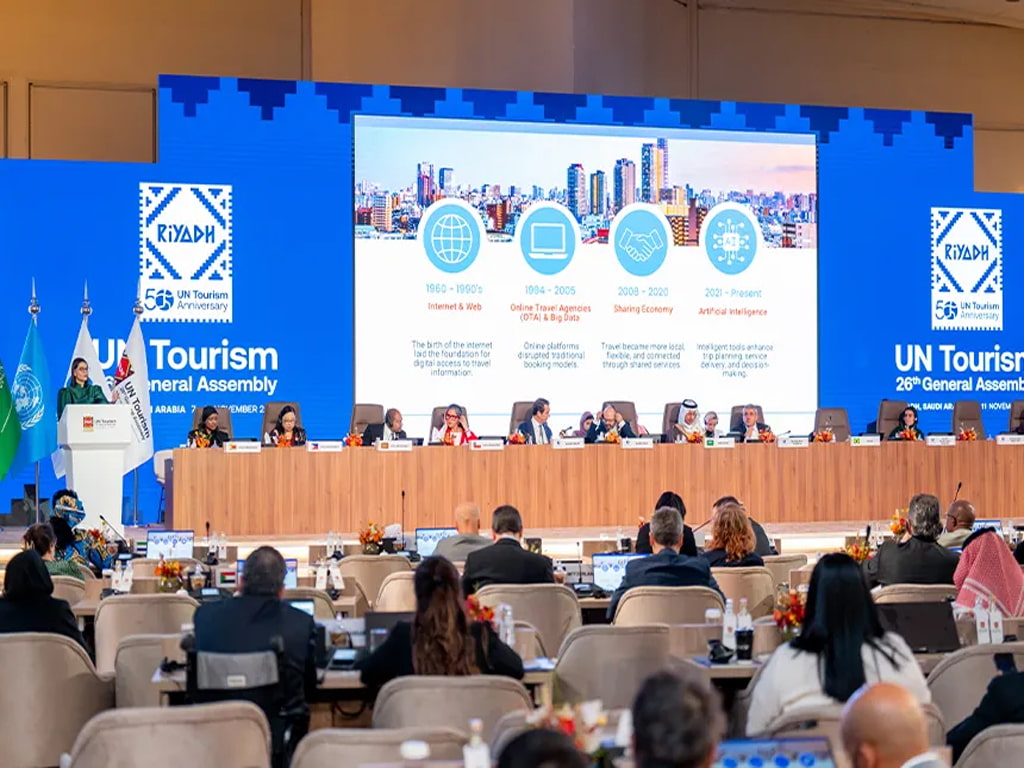UN Tourism has concluded the biggest General Assembly in its 50-year history, confirming new leadership, and announcing a shared vision for innovation and Artificial Intelligence.
The 26th session of
the UN Tourism General Assembly welcomed delegation from 148 Member
States to Riyadh, including 90 Ministers of Tourism and
70 Ambassadors.
Over three days, the Organization's Member
States advanced the shared Programme of Work, setting the course for a more
inclusive, innovative and sustainable future.
Zurab Pololikashvili, UN
Tourism Secretary-General, says: "As UN Tourism celebrates 50 years, we
look ahead to the next half-century. The sector will be transformed by
innovation and Artificial Intelligence. We are proud to support the top
innovators and to guide our Member States to fully benefit from the power of AI
to diversify the sector, drive inclusive growth and expand opportunities for
all."
We are proud to
support the top innovators and to guide our Member States to fully benefit from
the power of AI to diversify the sector, drive inclusive growth and expand
opportunities for all
Spotlight on
Artificial Intelligence
Reflecting UN
Tourism's leading role in advancing innovation and digital transformation of
the sector, a special Thematic Session on the Impact of Artificial
Intelligence brought together public and private sector leaders.
Member States were
provided with an overview of the place of AI in the Organization's agenda by
Executive Director Natalia Bayona, setting the stage for a policy debate
featuring interventions from more than 30 Heads of Delegation or high-level
equivalent. Joining Apostolos Tzitzikostas, EU Commissioner for
Sustainable Transport & Tourism, were representatives from Amadeus,
Trip.com, Microsoft and the World Economic Forum.
In Riyadh, the final
of the UN Tourism Artificial Intelligence Challenge recognized
the innovators leading the way in harnessing the power of new technology to
transform the sector. From the finalists, Smart Tour from Brazil was named as
the overall winner.
The session concluded
with the announcement of the Riyadh Declaration on the Future of
Tourism, a shared roadmap to guide the sector's forward. The Declaration
underscores strengthening international cooperation, resilience, and the
empowerment of local communities through digital innovation, AI integration,
and inclusive tourism economies. Signatories commit to take concrete steps,
including incentivizing investment in digital infrastructure, addressing
workforce shortages and skills gaps, and taking advantage of technological and
AI-driven initiatives to support local entrepreneurship.
New leadership and
expanding global presence
On the first day of
the General Assembly, Shaikha Al Nowais was confirmed as the new
Secretary-General of UN Tourism. Member States formally ratified her
nomination, meaning she will be the first woman to lead the United Nations
Specialized Agency for tourism in its 50-year history. She will begin her term
at the start of 2026.
Also in Riyadh, the
General Assembly formally approved the institutionalization of the UN Tourism
Africa & Americas Summit as a permanent biennial platform for dialogue and
political and technical cooperation between the two regions, as well as the creation
of a Mechanism for South-South Cooperation.
The proposal of the
Government of China to establish a Regional Office in the city of Shanghai, was
also approved by Members.
Looking ahead:
Innovation and Education for World Tourism Day
Member States approved
the proposals to celebrate World Tourism Day 2026 around the theme of “Digital
Agenda and Artificial Intelligence”, with El Salvador as the official host
country. The 2027 celebrations will be held around the theme of “Transforming
Tourism through Education”, with Cabo Verde to host.
Finally, Member States voted to hold the 27th edition of the UN Tourism General Assembly in the Dominican Republic. -TradeArabia News Service

